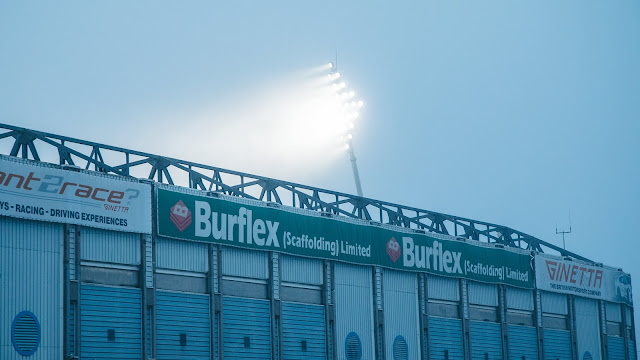Leeds United 1-4 Arsenal: For some of us, it’s not a good time - The Square Ball 20/12/21
DESERVE WHAT'S OBTAINED
Written by: Moscowhite • Daniel Chapman
From out of the fog this was some Arsenal we’ve seen before,
in Leeds United’s last season in the Premier League in 2003/04, when the
Gunners came to Elland Road and won 4-1 in the league, 4-1 in the FA Cup,
saving a 5-0 beating for Highbury in April. Leeds fans were just shrugging by
that point, as Thierry Henry scored four, sprinting through a defence of
Stephen Caldwell and Michael Duberry, a midfield featuring Lucas Radebe and Dom
Matteo unable to protect them. A side with Champions League class had been
dismantled: Martyn, Ferdinand, Woodgate, Dacourt, Bowyer, Kewell, Keane,
Fowler, all gone in two seasons. Too many in too short a time for any team to
cope with.
The present Leeds team have lost as many first team players
in a couple of weeks and a 4-1 defeat to Arsenal was inevitable and
historically too tidy. (Arsenal won by the same score at Elland Road in
September 2002, when Leeds were still good in theory.) Hardly any time has passed
since Marcelo Bielsa was calmly explaining that Leeds, with four medium term
injuries and one or two more game by game, were only reflecting the Premier
League average. He started this game without ten and an eleventh was limping
within ten minutes. After the game Bielsa talked about the injuries, the
stoppage time penalty at Chelsea, a result “difficult to imagine” at Manchester
City, and that the game with Arsenal would have been fairer at 3-2, but “the
4-1 is produced.” Diego Llorente, careful with his health, double-vaccinated
and boosted against the coronavirus, is ill, presumably catching it anyway.
It’s, “a run of form so negative that we’re going through,” said Bielsa, or in
other words, Leeds United are bang out of luck. From his conviction a few weeks
ago that United’s problems were run of the mill, this is the nearest I’ve heard
Bielsa come to saying the situation is out of control. “They’re all problems
that are usually resolved,” he said, “but in this case they’re not.”
There is a last days of Thomas Christiansen feel about Leeds
at the moment. His first nine games, in 2017/18, took Leeds top of the
Championship; a slump — just after the BBC asked if this was the season Leeds
would get promoted — was saved, and on Boxing Day Leeds were comfortably in the
play-off places, the season’s target. Next came carnage: Samu Saiz sent off in
Newport and banned for six weeks for spitting; Eunan O’Kane, Liam Cooper and
Gaetano Berardi sent off; two goalless draws punctuating wild defeats that left
Christiansen looking more and more bewildered, week by week, until Neil
Warnock’s Cardiff beat his Leeds 4-1 and that was the end for TC. What
followed, though, was even worse: half a million to get Paul Heckingbottom from
Barnsley bought four wins, four draws, and eight defeats.
It feels incredibly unlikely that Leeds will try changing the coach this season, and Bielsa is considerably less disposable than poor old Thomas Christiansen. You don’t remove a world class coach who has delivered the best results Leeds have enjoyed in a generation, even if Mick McCarthy is out of work, ready, willing and able. The course is set to discover what we never found out about Christiansen’s time in charge: what might the rest of the season have been like if he’d been allowed to try sorting it out?
How much sorting out Bielsa needs to do feels dependent on
factors out of his control. First, the Premier League meetings this week,
discussing whether to pause the season to deal with the new coronavirus
variant. So far, the plan to keep pressing on and get the games played isn’t
working, because the games are not being played, and fans are still either
travelling to fixtures that don’t take place or putting their health at risk in
stadium concourses, although I’m not convinced anybody in charge cares much
about that. Second, players coming back from injury. Last season we learned
that Leeds United’s best team can compete with anybody and belongs in the top
half of the Premier League. This season we’re learning that the patched up
reserves can’t.
Within Bielsa’s control are transfers and the style of play,
and the two are linked. The background sounds now are that Leeds will be moving
for new players in the January transfer window. Whether to recruit was a choice
in summer, but it’s a necessity now. Bielsa will not be the problem he’s
painted as: last week he deliberately stated that he is not against buying
players in winter, he just thinks it’s hard to get good ones. That’s not the
same thing as the pickiness that gets ascribed to him. A picky manager, in
2018, either would not have come to Leeds or would have insisted on the entire
squad being overhauled to meet his requirements. Instead Bielsa took Kalvin
Phillips, Liam Cooper, Stuart Dallas, Gjanni Alioski and the rest, working with
what he found to make what he needed. The infamous adaptation period, when
players are held back to learn, is a product of luxury. If he’s got the time,
he’ll use it. If he needs to throw a player straight in — Dan James, Raphinha —
they will go in.
That’s where style of play, or rather idea of play, is important. The other week Bielsa said throwing a plan out is easy: “But what’s difficult is to construct a new philosophy to substitute it, and know that it resolves the next game.” He brushed the theme again after the Arsenal match. “You have to be very convinced in a big way where you’re going, to absorb these types of moments,” he said. In other words, you have to keep believing in what you’re doing. That’s important when bringing in new players. Finding players to fit certain jobs on the field is hard enough, without ripping up those job descriptions and searching for players to fit a new style the existing squad aren’t even used to yet.
The plan for Leeds to get out of trouble is to stick with
the way they know how to play, find new players who can fit in, get the best
players fit, and keep going. At the bottom of the table it’s important to have
a coherent strategy, and that one, almost writing itself, is an advantage Leeds
shouldn’t squander.
The test it has to survive is the current run of games when
Leeds’ style of play has been carved open by Manchester City and Arsenal. The
Gunners were smart, aiming not at young right-back Cody Drameh but the
experienced players out of position on the other side, Stuart Dallas and Luke
Ayling, calculating they could be turned on their wrong feet and that Martin
Ødegaard, arriving through the middle, would be too strong for Adam Forshaw.
Chances made that way, though, were either blocked, or saved by the excellent
Illan Meslier. Arsenal’s goals were given them by Leeds, Jackie Harrison giving
up possession from his dead leg before Xhaka dived for a pen and Forshaw was
muscled off the ball, that was the first; Dallas passing behind Matuesz Klich
in the centre was the second; the third took advantage of space left by Ayling
and a cacophony of blundering blocks. That was the first half. Leeds improved
in the second half, taking themselves to the edge of a comeback when Joffy
Gelhardt’s penalty box skill won him another penalty, like against Wolves, a
dopey foul by Ben White, and Raphinha smacked in the spot kick; until with
seven minutes left Tyler Roberts gave the ball away and that was four.
The game was won in the first half, making Arsenal’s
full-time reaction strange. Mikel Arteta punched the air, hugging his staff
around him into a celebratory gang, as if after three away defeats in a row
they’d overcome some significant hurdle by seeing this game through to the end.
Honestly, if this Arsenal side hadn’t beaten this Leeds side, Arteta should
have shame-quit, but all game he and his players seemed to think they were
really doing something. Speaking about teams being depleted by Covid last week,
Bielsa said he wouldn’t want to “take advantage of a team that has that
difficulty”. Arsenal had no such qualms about Leeds United’s injury crisis.
Back at the start of December, Bielsa said it’s as important to deserve what
you get as to get what you deserve:
“Because if what’s deserved is not obtained, the path is the
correct one. If what’s obtained is not deserved, the path is not the right one.
In both cases time verifies those things — and the only thing I’m saying is
that what corresponds is to deserve what you get.”
Nothing good comes easy, and Leeds United’s third season of
Premier League football certainly won’t. Last season’s ethereal drift to 9th
now looks like what it was, a dream. This season’s fight to survive is how it
was supposed to be all along. This January, in the transfer market, in the
treatment room, on the training ground and on the pitch, Leeds will have to
deserve what they eventually will get.


